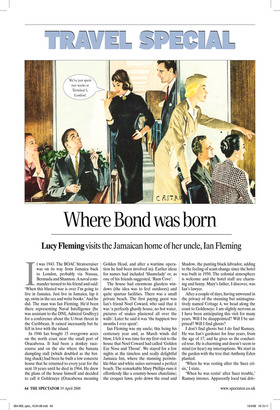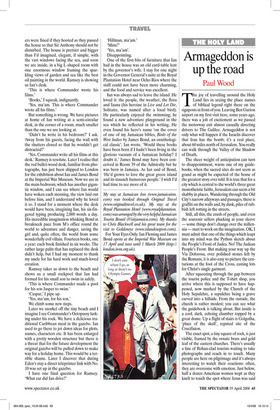Where Bond was born
Lucy Fleming visits the Jamaican home of her uncle, Ian Fleming It was 1943. The BOAC Stratocruiser was on its way from Jamaica back to London, probably via Nassau, Bermuda and Shannon. A naval commander turned to his friend and said: ‘When this blasted war is over I’m going to live in Jamaica. Just live in Jamaica, lap it up, swim in the sea and write books.’ And he did. The man was Ian Fleming. He’d been there representing Naval Intelligence (he was assistant to the DNI, Admiral Godfrey) for a conference about the U-boat threat in the Caribbean. It rained incessantly but he fell in love with the island.
In 1946 Ian bought 15 overgrown acres on the north coast near the small port of Oracabessa. It had been a donkey racecourse and on the site where the banana dumpling stall (which doubled as the betting shack) had been he built a low concrete house that he returned to every year for the next 18 years until he died in 1964. He drew the plans of the house himself and decided to call it Goldeneye (Oracabessa meaning Golden Head, and after a wartime operation he had been involved in). Earlier ideas for names had included ‘Shamelady’ or, as one of his friends suggested, ‘Rum Cove’.
The house had enormous glassless windows (the idea was to feel outdoors) and quite spartan facilities. There was a small private beach. The first paying guest was Ian’s friend Noel Coward, who said that it was ‘a perfectly ghastly house, no hot water, pictures of snakes plastered all over the walls’. Later he said it was ‘the happiest two months I ever spent’.
Ian Fleming was my uncle; this being his centenary year and, as March winds did blow, I felt it was time for my first visit to the house that Noel Coward had called ‘Golden Ear Nose and Throat’. We stayed for a few nights at the timeless and really delightful Jamaica Inn, where the stunning periwinkle-blue and white suites surround a perfect beach. The remarkable Mary Phillips runs it effortlessly like a country-house chatelaine; the croquet lawn, polo down the road and Shadow, the panting black labrador, adding to the feeling of scant change since the hotel was built in 1950. The colonial atmosphere is welcome and the hotel staff are charming and funny. Mary’s father, I discover, was Ian’s lawyer.
After a couple of days, having unwound in the privacy of the stunning but unimaginatively named Cottage 4, we head along the coast to Goldeneye. I am slightly nervous as I have been anticipating this visit for many years. Will I be disappointed? Will I be surprised? Will I find ghosts?
I don’t find ghosts but I do find Ramsey. He was Ian’s gardener for four years, from the age of 17, and he gives us the conducted tour. He is charming and doesn’t seem to mind (or hear) my interruptions. We start in the garden with the tree that Anthony Eden planted.
‘When he was resting after the Suez crisis,’ I state.
‘When he was restin’ after Suez trouble,’ Ramsey intones. Apparently local taxi driv ers were fined if they hooted as they passed the house so that Sir Anthony should not be disturbed. The house is prettier and bigger than I’d imagined, elegant, if simple, with the vast windows facing the sea, and soon we are inside, in a big L-shaped room with one enormous window framing the sparkling views of garden and sea like the best oil painting in the world. Ramsey is showing us Ian’s desk.
‘This is where Commander wrote his films.’ ‘Books,’ I squeak, indignantly.
‘Yes, ma’am. This is where Commander wrote all his films.’ But something is wrong. We have pictures at home of Ian writing at a semi-circular desk, in the corner of a room, much smaller than the one we are looking at.
‘Didn’t he write in his bedroom?’ I ask. ‘Away from his guests, facing the wall with the shutters closed so that he wouldn’t get distracted?’ ‘Yes. Commander write all his films at this desk.’ Ramsey is resolute. Later I realise that the red bullet-wood desk, familiar from photographs, has just been shipped to London for the exhibition about Ian and James Bond at the Imperial War Museum. Now we are in the main bedroom, which has another gigantic window, and I can see where Ian would have woken each morning, the view laid out before him, and I understand why he loved it so. I stand for a moment where the desk would have been, imagining Ian, his six-fingered typing producing 2,000 words a day. His incredible imagination whisking Bond at breakneck pace from M’s office round the world to adventure and danger, saving the girl and, quite often, the world from some wonderfully evil villain. Fourteen books, one a year; each book finished in six weeks. The rather large palm that has replaced the desk didn’t help, but I had my moment to thank my uncle for his hard work and much-loved creation.
Ramsey takes us down to the beach and shows us a small rockpool that Ian had formed for his small son to swim in safely.
‘This is where Commander made a pool for his son Jasper to swim.’ ‘Caspar,’ I pipe up.
‘Yes, ma’am, for his son.’ We climb some new steps.
Later we snorkel off the tiny beach and I imagine I see Commander’s Octopussy lurking under his rock. We have a delicious traditional Caribbean meal in the gazebo. Ian used to go there to jot down ideas for plots, names, characters etc. It has been enlarged with a pretty wooden structure but there is a threat that for the future development the original gazebo will be pulled down to make way for a holiday home. This would be a terrible shame. Later I discover that during Eden’s stay a direct teleprinter link with No. 10 was set up in the gazebo.
I have one final question for Ramsey. ‘What car did Ian drive?’ ‘Hillman, ma’am.’ ‘Minx?’ ‘Yes, ma’am’.
Disappointing.
One of the first bits of furniture that Ian had in the house was an old card-table lent by the governor’s wife. I stay for one night in the Governor General’s suite at the Royal Plantation Hotel near Ocho Rios where the staff could not have been more charming, and the food and service was excellent.
Ian was always sad to leave the island. He loved it: the people, the weather, the flora and fauna (his heroine in Live and Let Die, Solitaire, was named after a local bird). He particularly enjoyed the swimming; he found a new adventure playground in the sea which he reflected in his writing. He even found his hero’s name ‘on the cover of one of my Jamaican bibles, Birds of the West Indies by James Bond, an ornithological classic’. Ian wrote, ‘Would these books have been born if I hadn’t been living in the glorious vacuum of a Jamaican holiday? I doubt it.’ James Bond may have been conceived in Room 39 of the Admiralty but he was born in Jamaica. As Ian said of Bond, ‘He’d grown to love the great green island and its staunch humorous people.’ I wish I’d had time to see more of it.



















































































 Previous page
Previous page